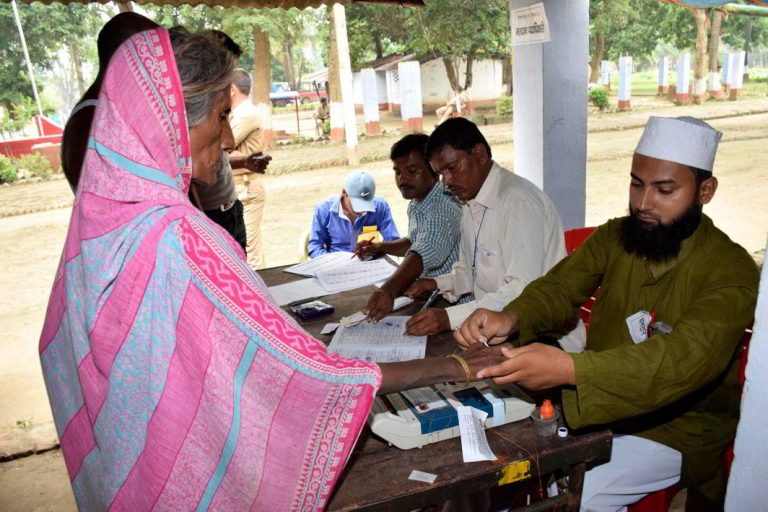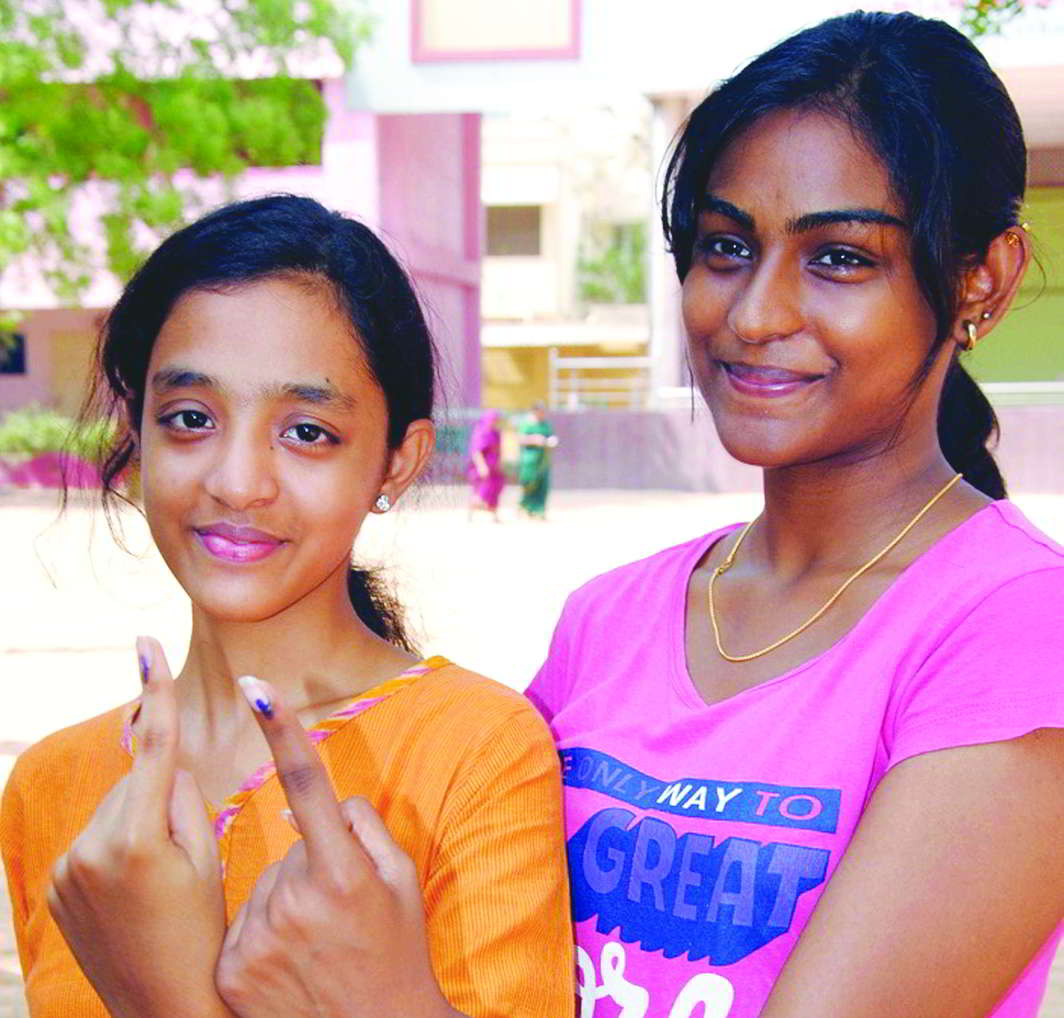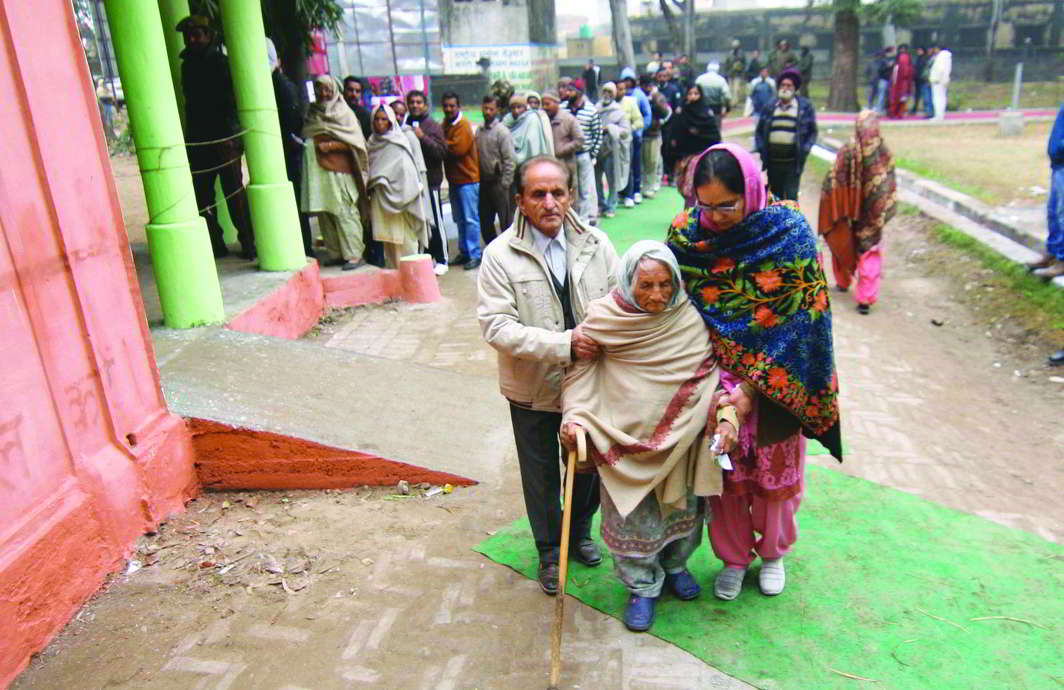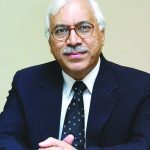
Above: A polling officer applies ink mark on the finger of a voter at a polling station in Bihar. Photo: UNI
While such an exercise may save money and lead to better administration, one should look for more practical alternatives
~By SY Quraishi
“The time has come to take a serious look at the possibility of simultaneous elections to parliament and state assemblies, and even municipal bodies, panchayats and cooperative bodies. Otherwise, in this country, this festival of elections will go on. In India, there is a continuous election season and election fever. Development takes a big hit. This has to be understood by all. That is why this suggestion for simultaneous elections.”
—Venkaiah Naidu
The Vice-President of India strongly advocated holding simultaneous elections at all three levels of governance in India recently. Such an idea was also proposed by Prime Minister Narendra Modi, and senior BJP leader LK Advani before him.
A Lok Sabha committee was set up to examine the feasibility of such a proposal. NITI Aayog has also published a paper on the subject.
Various arguments are put forward in favour of simultaneous elections. The foremost is that frequent elections hamper the normal functioning of the government and also disrupt day-to-day life of citizens.
This happens because as soon as the Election Commission announces the election dates, the Model Code of Conduct comes into operation. This means that the government cannot announce any new schemes, including at the state level, make any new appointments and cannot transfer or appoint officials in direct or indirect line of election management. Ministers get busy in election campaigning and stop attending their offices. The district administration also gets busy with conducting elections at the cost of virtually everything else.

Further, Article 324(6) of the constitution requires the president or the governor of a state to provide the Election Commission with whatever staff it may require.
Given that we now have about 9.3 lakh polling booths in the country for the Lok Sabha elections, at least 11 million people are required to conduct smooth polls.
It is, therefore, argued that frequent elections mean that a huge number of public servants have to be present for election duty, and hence are unable to carry out their normal responsibilities.
The second argument for simultaneous elections is cost—the cost of organising the election and campaign expenditures borne by parties and candidates. Organisation costs include production of EVMs, printing of stationary, the ballot paper that is put in the EVMs and deployment and travel of staff, including security personnel.
Although there is no precise measure of the total cost of an election—a large part of it being indirect costs borne by respective departments and state governments, it is estimated that a general election in India costs around Rs 4,500 crore. The more serious issue, however, is the cost borne by parties and candidates, given that there is no cap on the amount that can be spent by political parties for every election. One estimate put the total cost of contesting the elections of 2014 at Rs 30,000 crore.
Another argument in favour of simultaneous elections is that they lead to escalation of the curse of 4 Cs—communalism, casteism, corruption, and crony capitalism. Frequent elections mean that there is no respite from these evils at all.
While these arguments may seem reason enough to move towards simultaneous elections, the truth is that, while the idea is desirable, it is doubtful if it is feasible. Let us consider a practical constraint. Even if elections were to be held simultaneously, every state and assembly will witness its own political course. What is one to do if a particular state witnesses an upturned majority in case a few of the MLAs decide to shift their “loyalty”?
How are simultaneous elections to be continued in such a scenario? Or, as was the case in 1998, what happens if the Lok Sabha is dissolved within 13 days? Do we also dissolve all democratically elected state assemblies for reasons beyond the states’ boundaries? The same argument extends to panchayat elections. Why should they be affected if the state assembly is dissolved?

Separates elections are not without some other benefits, like the following:
- Politicians are notorious for disappearing for five years once the election is over, forgetting their accountability to the people. Frequent elections ensure that politicians show their faces to the people regularly.
- Election time results in creation of work opportunities for thousands of workers at the grassroots level. Frequent elections ensure more jobs.
- Common people, particularly the poor, love frequent elections.
While all the reasons given in support of synchronized elections are legitimate and need to be solved in order for Indian democracy to evolve, as seen above, simultaneous elections may not be a feasible option.
There is a need to look for more practical alternatives. The issue of outrageous spending by political parties during the election season can be tackled if a ceiling is put on it. Corporate funding must be banned and replaced with state funding of political parties There is an urgent need to set up a transparent system of public funding of parties. Even the duration of elections can be reduced from the present 2-3 months to a bare minimum of 33 days if sufficient number of paramilitary companies are made available.
A far-reaching electoral reform like simultaneous election should be attempted only with complete political consensus. I am sure the government will spare no effort to create that consensus instead of forcing it through the might of its majority.
—The writer is a former Chief Election Commissioner of India and author of An Undocumented Wonder—the Making of the Great Indian Election


